Unit 2 Colours Grammar课件(共30张PPT) 牛津译林版英语九年级上册
文档属性
| 名称 | Unit 2 Colours Grammar课件(共30张PPT) 牛津译林版英语九年级上册 | 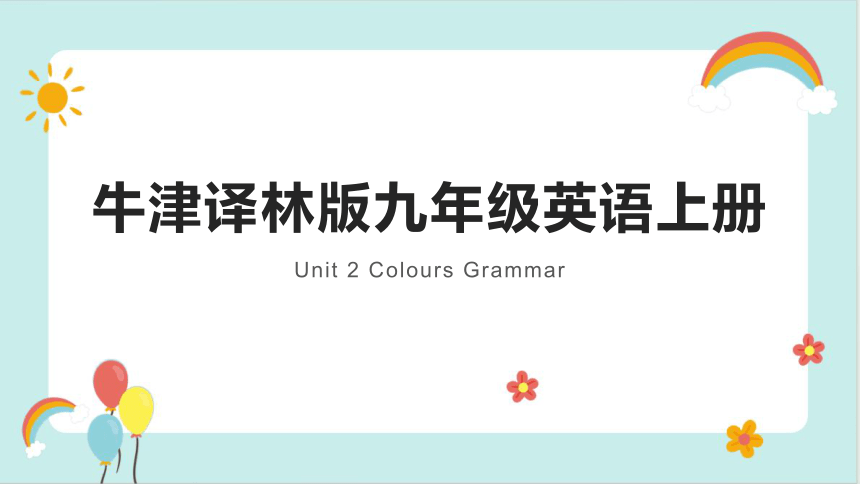 | |
| 格式 | pptx | ||
| 文件大小 | 2.2MB | ||
| 资源类型 | 教案 | ||
| 版本资源 | 牛津译林版 | ||
| 科目 | 英语 | ||
| 更新时间 | 2024-09-21 13:43:47 | ||
图片预览

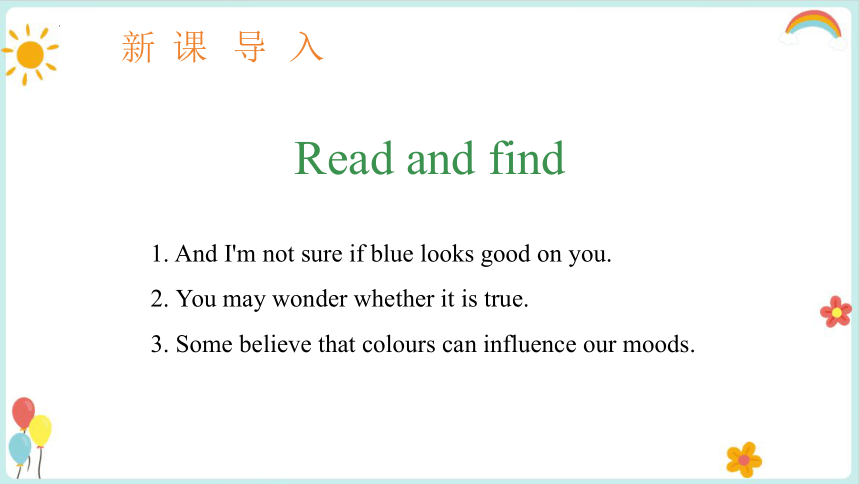
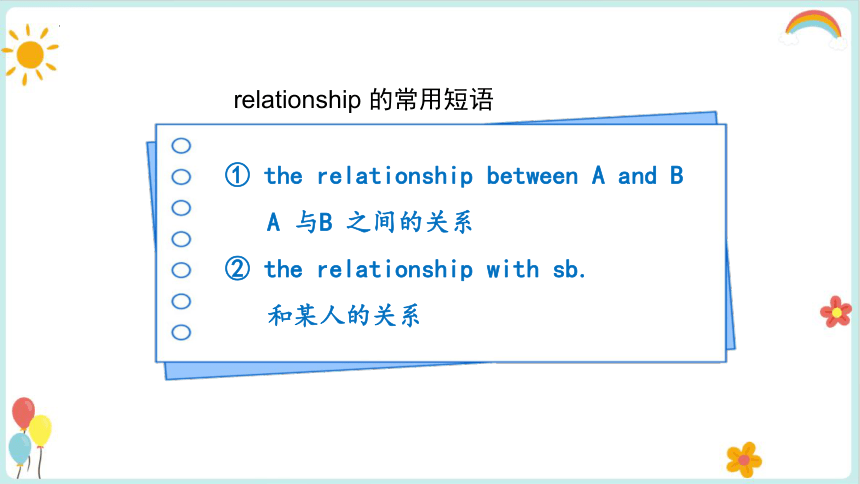
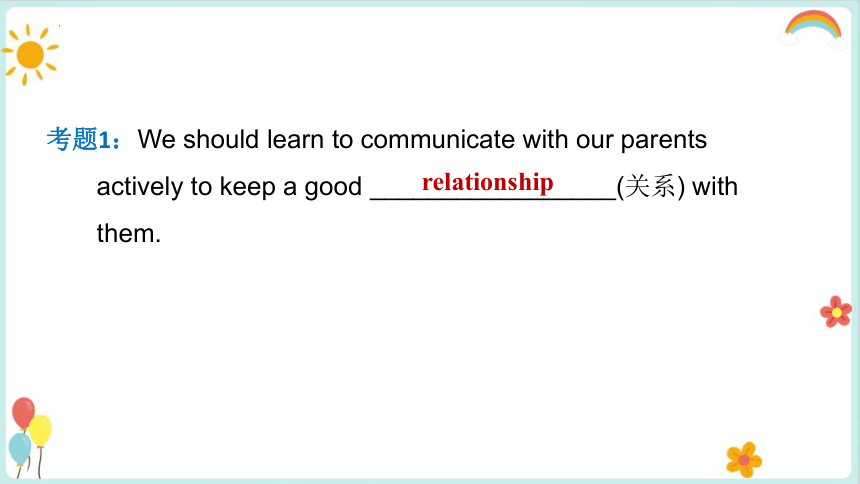
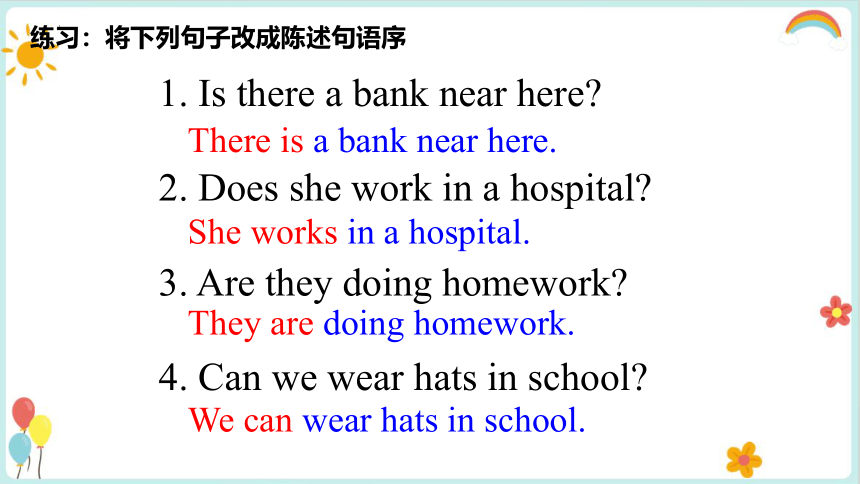
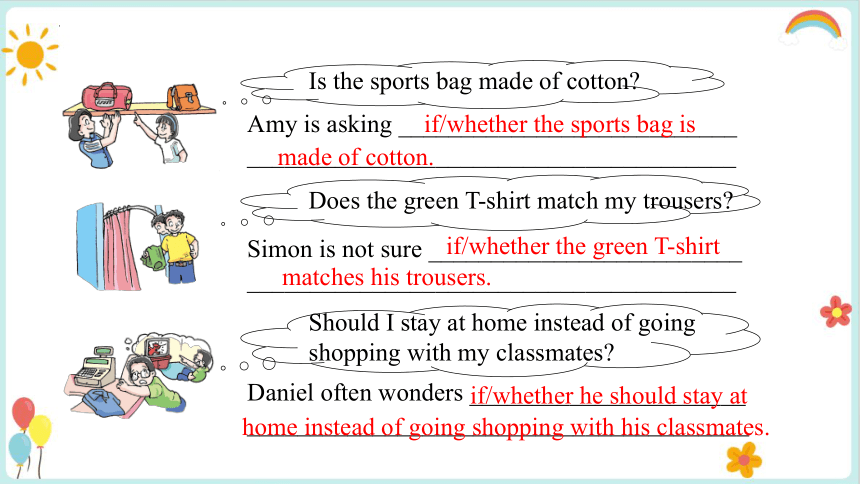
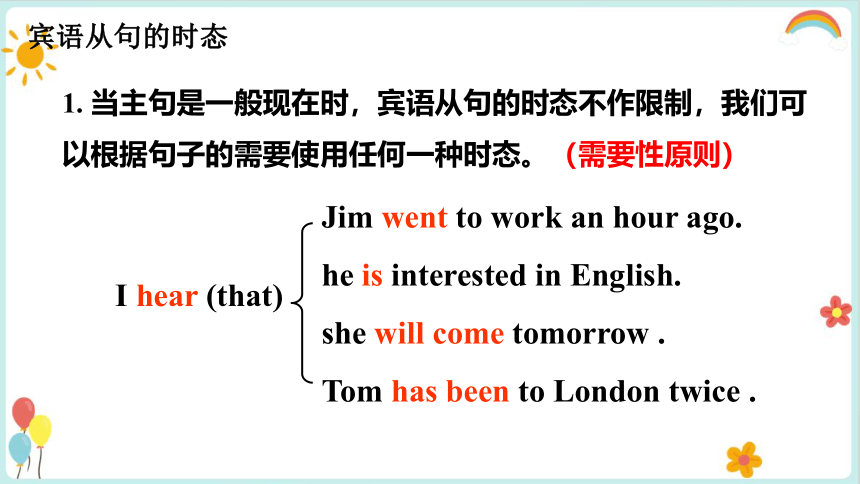
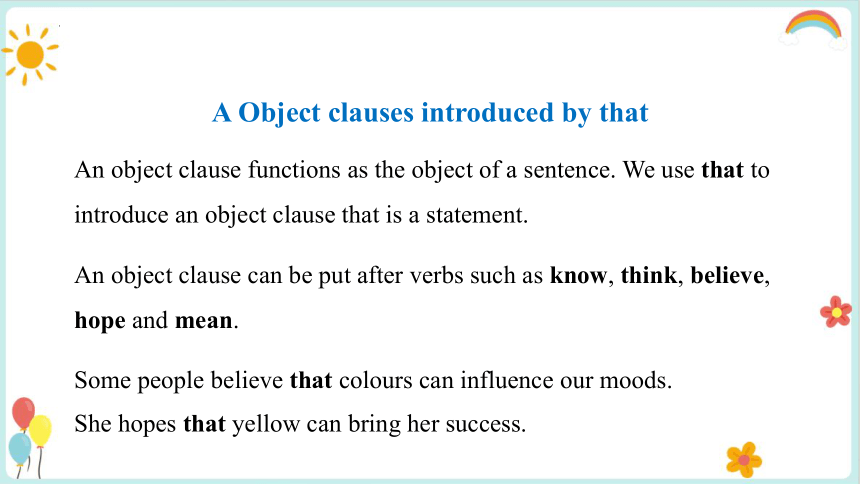
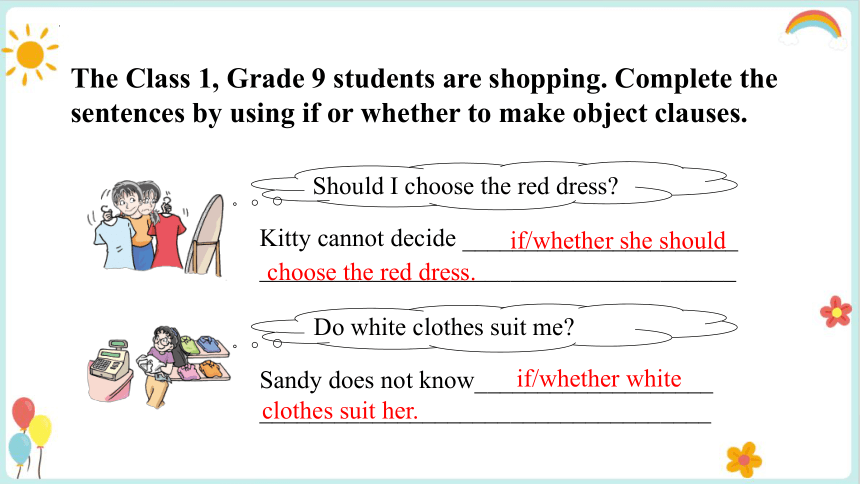

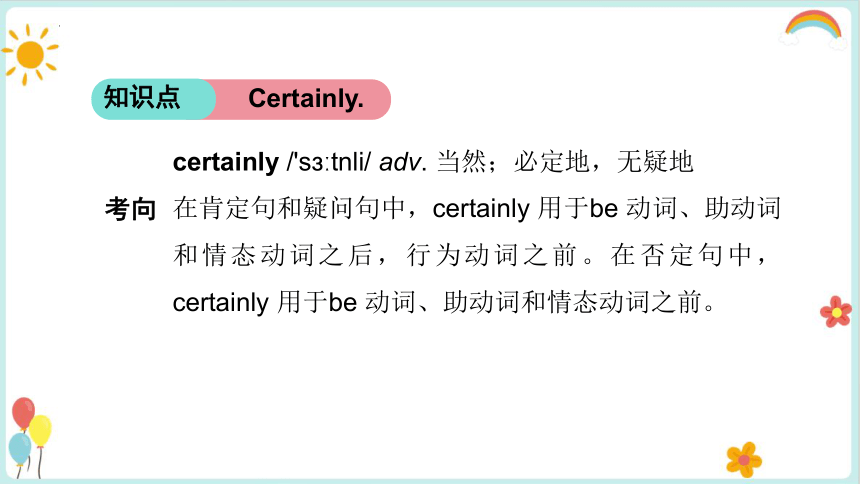
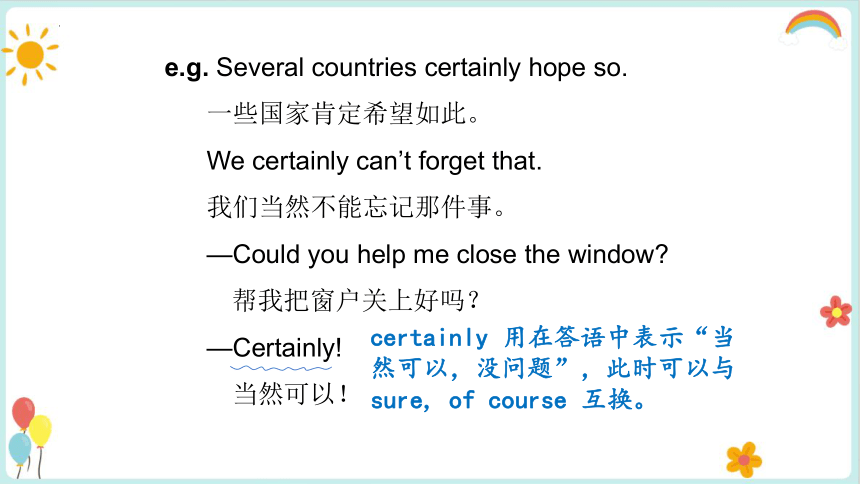
文档简介
(共30张PPT)
牛津译林版九年级英语上册
Unit 2 Colours Grammar
新
课
导
入
Read and find
1. And I'm not sure if blue looks good on you.
2. You may wonder whether it is true.
3. Some believe that colours can influence our moods.
relationship 的常用短语
① the relationship between A and B
A 与B 之间的关系
② the relationship with sb.
和某人的关系
考题1:We should learn to communicate with our parents actively to keep a good _________________(关系) with them.
relationship
1. Is there a bank near here
2. Does she work in a hospital
3. Are they doing homework
4. Can we wear hats in school
There is a bank near here.
She works in a hospital.
They are doing homework.
练习:将下列句子改成陈述句语序
We can wear hats in school.
Is the sports bag made of cotton
Does the green T-shirt match my trousers
Amy is asking ___________________________
_______________________________________
if/whether the sports bag is
made of cotton.
Simon is not sure _________________________
_______________________________________
if/whether the green T-shirt
matches his trousers.
Should I stay at home instead of going shopping with my classmates
Daniel often wonders ______________________
________________________________________
home instead of going shopping with his classmates.
if/whether he should stay at
1. 当主句是一般现在时,宾语从句的时态不作限制,我们可以根据句子的需要使用任何一种时态。(需要性原则)
宾语从句的时态
I hear (that)
Jim went to work an hour ago.
he is interested in English.
she will come tomorrow .
Tom has been to London twice .
A Object clauses introduced by that
An object clause functions as the object of a sentence. We use that to introduce an object clause that is a statement.
An object clause can be put after verbs such as know, think, believe, hope and mean.
Some people believe that colours can influence our moods.
She hopes that yellow can bring her success.
The Class 1, Grade 9 students are plete the sentences by using if or whether to make object clauses.
Should I choose the red dress
Kitty cannot decide ______________________
______________________________________
if/whether she should
choose the red dress.
Do white clothes suit me
Sandy does not know___________________ ____________________________________
if/whether white
clothes suit her.
Language Goal
1. 能熟悉并正确运用本课时的重点单词和短语。
2. 能掌握that引导的宾语从句。
3. 能掌握if或whether引导的宾语从句。
certainly /'s tnli/ adv. 当然;必定地,无疑地
在肯定句和疑问句中,certainly 用于be 动词、助动词和情态动词之后,行为动词之前。在否定句中,certainly 用于be 动词、助动词和情态动词之前。
考向
知识点
Certainly.
e.g. Several countries certainly hope so.
一些国家肯定希望如此。
We certainly can’t forget that.
我们当然不能忘记那件事。
—Could you help me close the window
帮我把窗户关上好吗?
—Certainly!
当然可以!
certainly 用在答语中表示“当然可以,没问题”,此时可以与sure, of course 互换。
考题2:—The game is too hard for me. I will ______ lose.
—You should never say no before you try.
A. well B. certainly
C. carefully D. quickly
B
好 当然
认真地 快速地
everyday /'evride / adj. 每天的;日常的
辨析:everyday 与every day
everyday 形容词,在句中作定语
every day 副词短语,在句中作时间状语
知识点
I think colours influence our everyday lives in many ways.
An object clause can also follow adjectives such as certain, sure and glad.
He is glad that the walls in his room are blue.
She is sure that yellow can bring her good luck.
In informal English we often drop that.
I think (that) blue is better than pink.
“I'm feeling blue” means (that) “I'm feeling sad”.
Do you think (that) your favourite colour matches your characteristics
Sandy is chatting online with Millie about room colours. Try to add that to each object clause.
▲
Millie: Did you know there is a relationship between colours and moods
Sandy: Certainly. I think colours influence our everyday lives in many ways.
Millie: How should we choose the colours for the rooms of a house
Sandy: Most people think light colours are better than dark ones.
Millie: Yes. I notice light colours make rooms seem larger.
Sandy: Sure. I also know blue can make us feel relaxed.
Millie: Yes. My mum says blue is suitable for bedrooms. I also find some
people prefer orange for their dining rooms.
Sandy: True, but it depends on personal taste. Anyway, we should choose
the colour which makes us feel comfortable.
∧
(that)
∧
(that)
∧
(that)
∧
(that)
∧
(that)
∧
(that)
∧
(that)
一语辨异
Daniel teaches them everyday English every day.
丹尼尔每天教他们日常英语。
e.g. The Internet has become a part of everyday life.
互联网已成为日常生活的一部分。
I eat breakfast every day.
我每天都吃早餐。
B Object clauses introduced by if/whether
We use if or whether to introduce an object clause that expresses a yes/no question. Such an object clause often follows verbs such as ask, see, wonder and find out. The word order in the clause should be the same as that in a statement.
You may wonder if/whether colours influence our moods.
Sandy asks if/whether orange can cheer her up.
考题3:[ 宜昌] 我们珍惜日常生活中与家人和朋友在一起的时光。(everyday)
We value the time we spend with our family and friends _____________________________________________.
in (our) everyday life (lives)
the sun is much bigger than the moon .
Summer is after Spring .
the earth moves around the sun.
He told me (that)
We knew (that)
The teacher told us (that)
当宾语从句说明的是客观存在的事实或者是客观存在的真理时,就不用受到主句时态的限制,仍是用一般现在时态。(特殊性原则)
宾语从句的时态
instead of 而不是,代替
辨析:instead of 与instead
instead of 介词短语,意为“代替……;而不是……”,连接否定的内容,常用于句中,后跟名词、代词或动词-ing。
instead 副词,意为“代替;反而”,通常用于句末。上句含有否定意义时,它可用于句首来引出下句并提出相反的情况。
知识点
Should I stay at home instead of going shopping
with my classmates
e.g. On Sunday, he likes to stay at home instead of going out.
他周日喜欢待在家里而不喜欢出去。
—Will you go shopping today 今天你去购物吗?
—No, I’ll stay at home instead. 不,我就待在家里。
宾语从句三要素
连接词
that(陈述句 )
if/whether(一般疑问句 )
时态
主句为一般现在时从句可为任何时态
主句为一般过去时从句
为过去的某种时态
一般过去时
过去将来时
过去进行时
过去完成时
语序
宾语从句的语序都为陈述句语序
从句为客观真理、自然现象、公式定理 、名言警句,从句时态依然为一般现在时
Summary
but it also represents envy. Did you know __________ red represents good luck in China It is often used for celebrations!
Please tell me your favourite colour and __________ you know anything else about colours. Write back soon.
Best wishes,
Daniel
that
if/whether
I believe_____________________________________________.
I wonder ____________________________________________.
I want to know _______________________________________
____________________________________________________.
I do not know ________________________________________
____________________________________________________.
I am not certain _______________________________________
____________________________________________________.
(that) Dad knows a lot about colours
if/whether red is just the colour of heat and power
if/whether yellow was once the colour of the
rulers in ancient China
if/whether the rulers in ancient Europe liked to wear purple
if/whether all the doctors in the world wear white uniforms
重点单词和短语:
relationship, certainly, everyday, personal, suit, celebration, ancient
that引导的宾语从句:
我们可用that引导宾语从句,此时从句部分相当于一个_______;引导宾语从句的that没有词义,不充当句子成分,在口语或非正式文体中常常被______。
if/whether引导的宾语从句:
我们可用if或whether引导宾语从句,此时从句部分的语义相当于一个____________。
Unit 2
Period 3
陈述句
省略
一般疑问句
1. — Excuse me, may I use your dictionary for a while
— ________. Here you are.
2. It's very dangerous to show your _______ information like your name and
address on WeChat.
3. John is very friendly and he has a good _________ with all his classmates.
4. — Do you know the city of Pingyao in Shanxi
— Yes. It is an old city famous for its ________ walls.
5. — Will there be any _________ for the coming New Year in our school
— Yes. All of the students can take part in them.
当堂检测
relationship, person, celebration, certain, ancient
一、选用方框中单词的正确形式填空。
Certainly
personal
relationship
ancient
celebrations
二、用 that,if 或whether 填空。
1. — John, would you like to go camping with me this afternoon
— I'd like to, but I'm not sure _________ my parents will agree.
2. I'm not good at English, and I wonder _________ or not I can pass
the English test.
3. I believe _________ I have made a wise decision, so I won't change
my mind.
4. — I hope _________ all my dreams can come true.
— If you try your best, they will surely be realized.
5. — May I ask _________ you will come to our party this weekend
— Yes, I'll be glad to. Thanks for your invitation.
if/whether
whether
that
that
if/whether
牛津译林版九年级英语上册
Unit 2 Colours Grammar
新
课
导
入
Read and find
1. And I'm not sure if blue looks good on you.
2. You may wonder whether it is true.
3. Some believe that colours can influence our moods.
relationship 的常用短语
① the relationship between A and B
A 与B 之间的关系
② the relationship with sb.
和某人的关系
考题1:We should learn to communicate with our parents actively to keep a good _________________(关系) with them.
relationship
1. Is there a bank near here
2. Does she work in a hospital
3. Are they doing homework
4. Can we wear hats in school
There is a bank near here.
She works in a hospital.
They are doing homework.
练习:将下列句子改成陈述句语序
We can wear hats in school.
Is the sports bag made of cotton
Does the green T-shirt match my trousers
Amy is asking ___________________________
_______________________________________
if/whether the sports bag is
made of cotton.
Simon is not sure _________________________
_______________________________________
if/whether the green T-shirt
matches his trousers.
Should I stay at home instead of going shopping with my classmates
Daniel often wonders ______________________
________________________________________
home instead of going shopping with his classmates.
if/whether he should stay at
1. 当主句是一般现在时,宾语从句的时态不作限制,我们可以根据句子的需要使用任何一种时态。(需要性原则)
宾语从句的时态
I hear (that)
Jim went to work an hour ago.
he is interested in English.
she will come tomorrow .
Tom has been to London twice .
A Object clauses introduced by that
An object clause functions as the object of a sentence. We use that to introduce an object clause that is a statement.
An object clause can be put after verbs such as know, think, believe, hope and mean.
Some people believe that colours can influence our moods.
She hopes that yellow can bring her success.
The Class 1, Grade 9 students are plete the sentences by using if or whether to make object clauses.
Should I choose the red dress
Kitty cannot decide ______________________
______________________________________
if/whether she should
choose the red dress.
Do white clothes suit me
Sandy does not know___________________ ____________________________________
if/whether white
clothes suit her.
Language Goal
1. 能熟悉并正确运用本课时的重点单词和短语。
2. 能掌握that引导的宾语从句。
3. 能掌握if或whether引导的宾语从句。
certainly /'s tnli/ adv. 当然;必定地,无疑地
在肯定句和疑问句中,certainly 用于be 动词、助动词和情态动词之后,行为动词之前。在否定句中,certainly 用于be 动词、助动词和情态动词之前。
考向
知识点
Certainly.
e.g. Several countries certainly hope so.
一些国家肯定希望如此。
We certainly can’t forget that.
我们当然不能忘记那件事。
—Could you help me close the window
帮我把窗户关上好吗?
—Certainly!
当然可以!
certainly 用在答语中表示“当然可以,没问题”,此时可以与sure, of course 互换。
考题2:—The game is too hard for me. I will ______ lose.
—You should never say no before you try.
A. well B. certainly
C. carefully D. quickly
B
好 当然
认真地 快速地
everyday /'evride / adj. 每天的;日常的
辨析:everyday 与every day
everyday 形容词,在句中作定语
every day 副词短语,在句中作时间状语
知识点
I think colours influence our everyday lives in many ways.
An object clause can also follow adjectives such as certain, sure and glad.
He is glad that the walls in his room are blue.
She is sure that yellow can bring her good luck.
In informal English we often drop that.
I think (that) blue is better than pink.
“I'm feeling blue” means (that) “I'm feeling sad”.
Do you think (that) your favourite colour matches your characteristics
Sandy is chatting online with Millie about room colours. Try to add that to each object clause.
▲
Millie: Did you know there is a relationship between colours and moods
Sandy: Certainly. I think colours influence our everyday lives in many ways.
Millie: How should we choose the colours for the rooms of a house
Sandy: Most people think light colours are better than dark ones.
Millie: Yes. I notice light colours make rooms seem larger.
Sandy: Sure. I also know blue can make us feel relaxed.
Millie: Yes. My mum says blue is suitable for bedrooms. I also find some
people prefer orange for their dining rooms.
Sandy: True, but it depends on personal taste. Anyway, we should choose
the colour which makes us feel comfortable.
∧
(that)
∧
(that)
∧
(that)
∧
(that)
∧
(that)
∧
(that)
∧
(that)
一语辨异
Daniel teaches them everyday English every day.
丹尼尔每天教他们日常英语。
e.g. The Internet has become a part of everyday life.
互联网已成为日常生活的一部分。
I eat breakfast every day.
我每天都吃早餐。
B Object clauses introduced by if/whether
We use if or whether to introduce an object clause that expresses a yes/no question. Such an object clause often follows verbs such as ask, see, wonder and find out. The word order in the clause should be the same as that in a statement.
You may wonder if/whether colours influence our moods.
Sandy asks if/whether orange can cheer her up.
考题3:[ 宜昌] 我们珍惜日常生活中与家人和朋友在一起的时光。(everyday)
We value the time we spend with our family and friends _____________________________________________.
in (our) everyday life (lives)
the sun is much bigger than the moon .
Summer is after Spring .
the earth moves around the sun.
He told me (that)
We knew (that)
The teacher told us (that)
当宾语从句说明的是客观存在的事实或者是客观存在的真理时,就不用受到主句时态的限制,仍是用一般现在时态。(特殊性原则)
宾语从句的时态
instead of 而不是,代替
辨析:instead of 与instead
instead of 介词短语,意为“代替……;而不是……”,连接否定的内容,常用于句中,后跟名词、代词或动词-ing。
instead 副词,意为“代替;反而”,通常用于句末。上句含有否定意义时,它可用于句首来引出下句并提出相反的情况。
知识点
Should I stay at home instead of going shopping
with my classmates
e.g. On Sunday, he likes to stay at home instead of going out.
他周日喜欢待在家里而不喜欢出去。
—Will you go shopping today 今天你去购物吗?
—No, I’ll stay at home instead. 不,我就待在家里。
宾语从句三要素
连接词
that(陈述句 )
if/whether(一般疑问句 )
时态
主句为一般现在时从句可为任何时态
主句为一般过去时从句
为过去的某种时态
一般过去时
过去将来时
过去进行时
过去完成时
语序
宾语从句的语序都为陈述句语序
从句为客观真理、自然现象、公式定理 、名言警句,从句时态依然为一般现在时
Summary
but it also represents envy. Did you know __________ red represents good luck in China It is often used for celebrations!
Please tell me your favourite colour and __________ you know anything else about colours. Write back soon.
Best wishes,
Daniel
that
if/whether
I believe_____________________________________________.
I wonder ____________________________________________.
I want to know _______________________________________
____________________________________________________.
I do not know ________________________________________
____________________________________________________.
I am not certain _______________________________________
____________________________________________________.
(that) Dad knows a lot about colours
if/whether red is just the colour of heat and power
if/whether yellow was once the colour of the
rulers in ancient China
if/whether the rulers in ancient Europe liked to wear purple
if/whether all the doctors in the world wear white uniforms
重点单词和短语:
relationship, certainly, everyday, personal, suit, celebration, ancient
that引导的宾语从句:
我们可用that引导宾语从句,此时从句部分相当于一个_______;引导宾语从句的that没有词义,不充当句子成分,在口语或非正式文体中常常被______。
if/whether引导的宾语从句:
我们可用if或whether引导宾语从句,此时从句部分的语义相当于一个____________。
Unit 2
Period 3
陈述句
省略
一般疑问句
1. — Excuse me, may I use your dictionary for a while
— ________. Here you are.
2. It's very dangerous to show your _______ information like your name and
address on WeChat.
3. John is very friendly and he has a good _________ with all his classmates.
4. — Do you know the city of Pingyao in Shanxi
— Yes. It is an old city famous for its ________ walls.
5. — Will there be any _________ for the coming New Year in our school
— Yes. All of the students can take part in them.
当堂检测
relationship, person, celebration, certain, ancient
一、选用方框中单词的正确形式填空。
Certainly
personal
relationship
ancient
celebrations
二、用 that,if 或whether 填空。
1. — John, would you like to go camping with me this afternoon
— I'd like to, but I'm not sure _________ my parents will agree.
2. I'm not good at English, and I wonder _________ or not I can pass
the English test.
3. I believe _________ I have made a wise decision, so I won't change
my mind.
4. — I hope _________ all my dreams can come true.
— If you try your best, they will surely be realized.
5. — May I ask _________ you will come to our party this weekend
— Yes, I'll be glad to. Thanks for your invitation.
if/whether
whether
that
that
if/whether
